On November 29, Vietnam Report announced the Top 10 prestigious companies in the Logistics industry in 2024. The announcement and honoring ceremony for typical enterprises organized by Vietnam Report and VietNamNet Newspaper will take place in January 2025 in Hanoi .
Top 10 Reputable Logistics Companies in 2024 are built on scientific and objective principles with three main criteria: Financial capacity shown in the most recent financial report; Media reputation assessed by Media Coding method; Survey of research subjects and stakeholders.
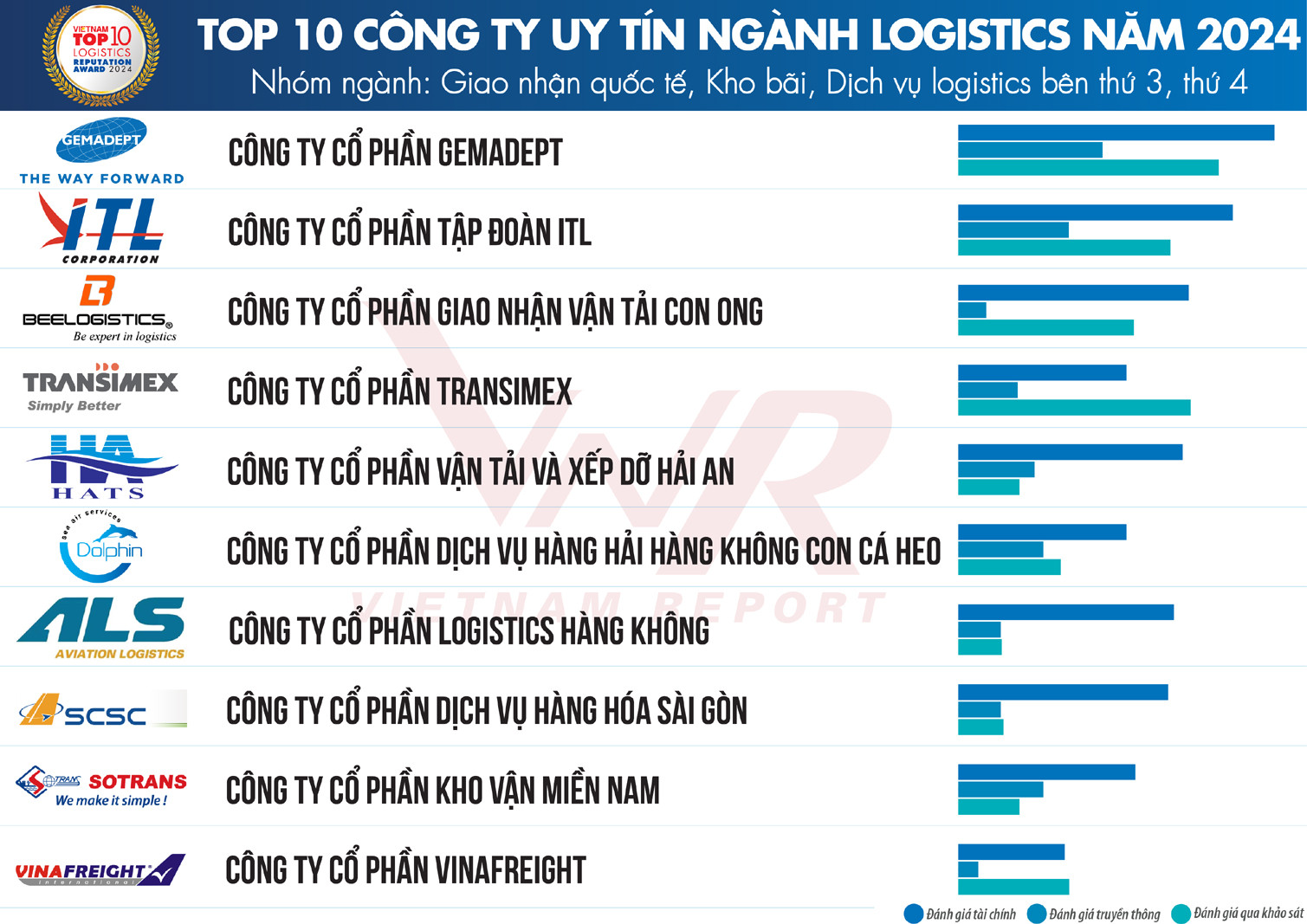
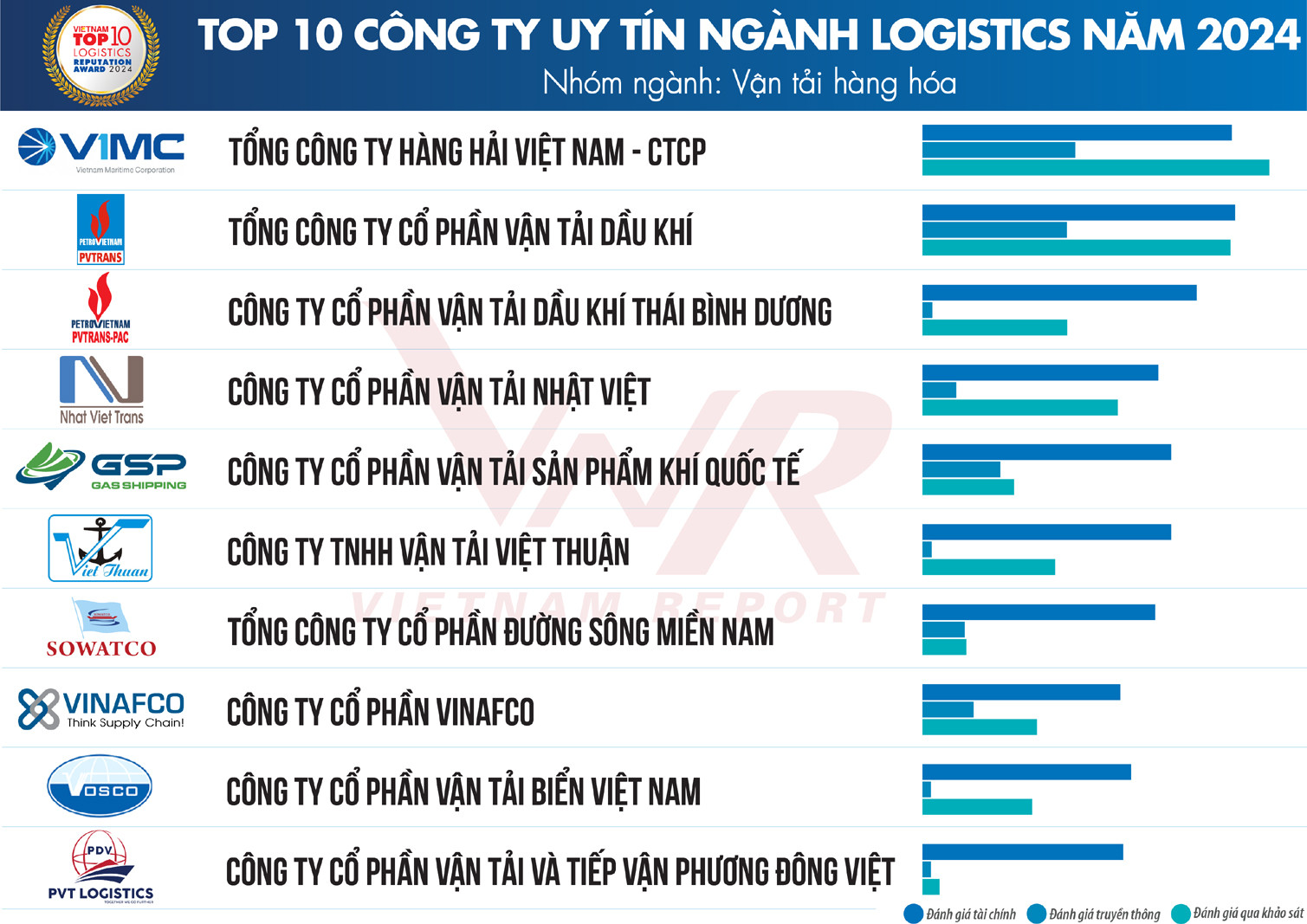
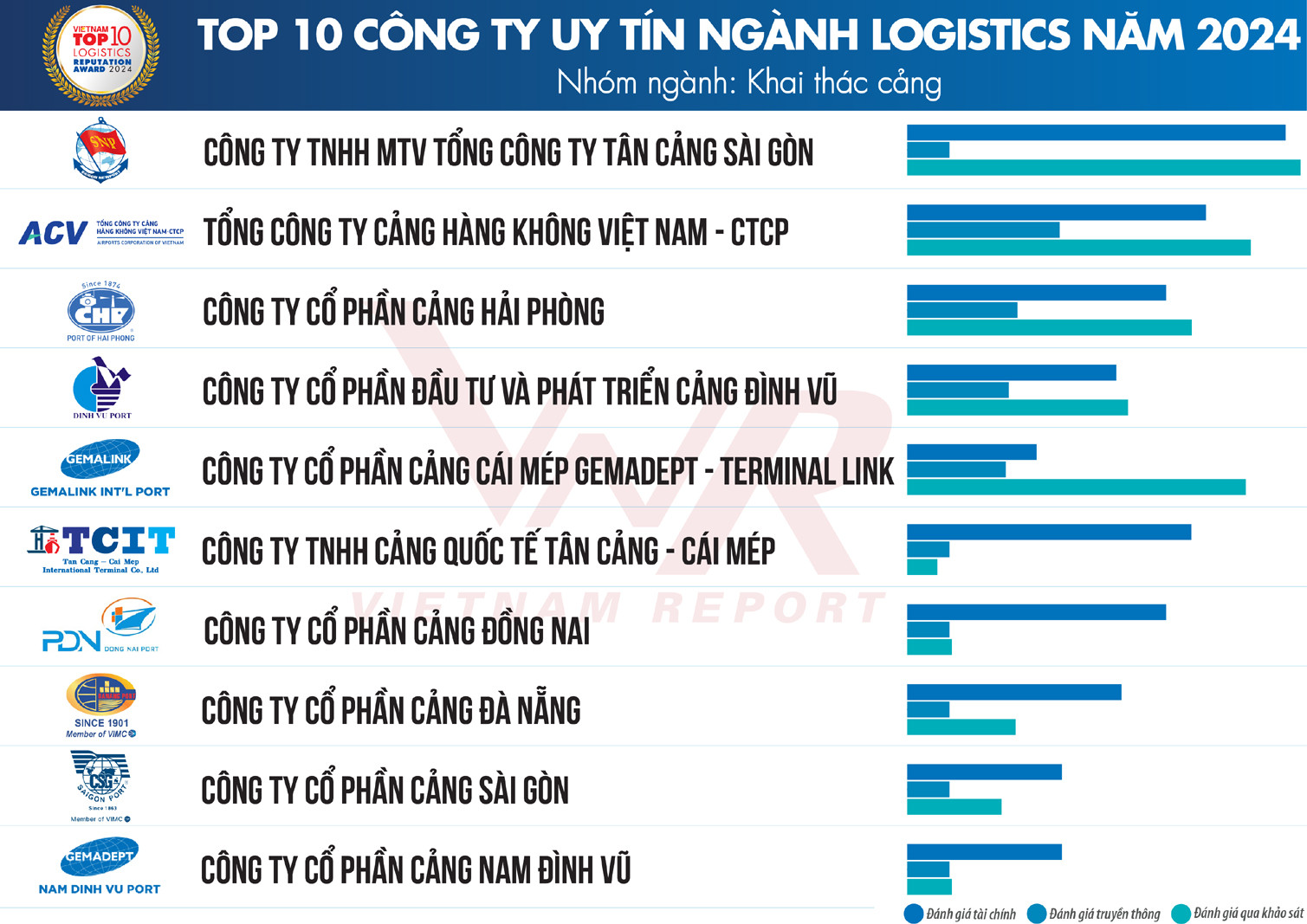
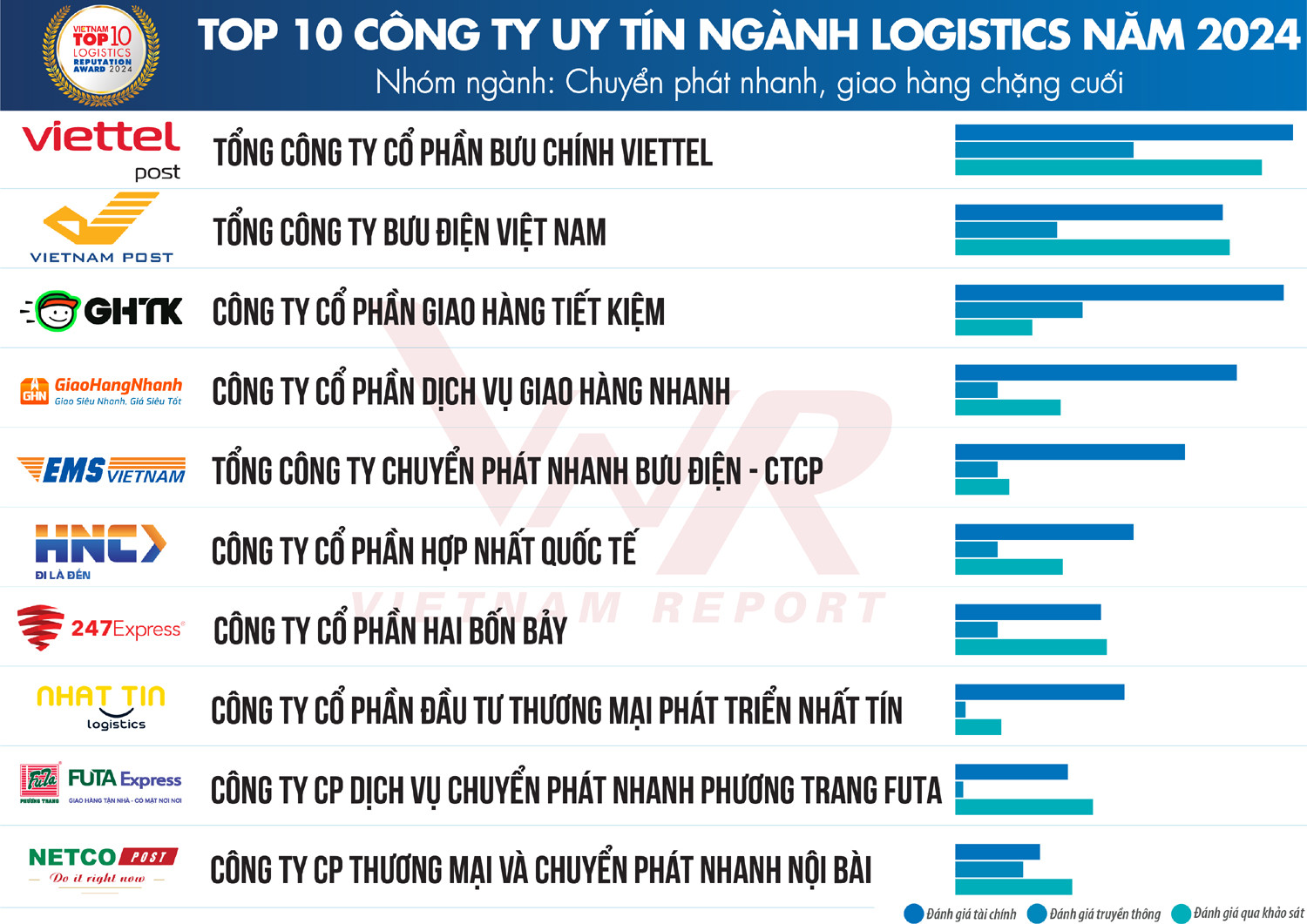
Export recovery becomes the main driving force of the logistics industry
2023 marks a challenging period for the global economy as a series of “hot” issues continue to put pressure on manufacturing and service industries, especially logistics - the lifeblood of the economy. According to a survey by Vietnam Report in 2023, most logistics enterprises recorded a decline in business results, of which 40% of enterprises experienced a significant decrease in profits.
By 2024, Vietnam's logistics industry is expected to see a strong recovery thanks to export growth, government support, and improvements in the global supply chain. The total volume of goods transported through seaports is estimated to increase by about 14% in the first 10 months of 2024, reaching over 570 million tons. Of which, dry cargo and containers account for a large proportion with handling volumes reaching over 321 and 191 million tons, respectively. In addition, the expansion of industrial parks also contributes to boosting logistics demand. According to CBRE, by the end of June 2024, the occupancy rate in industrial parks averaged 81% in the North and 92% in the South. The above figures are expected to be even more positive thanks to continued strong FDI inflows, with a total registered capital of over 27.26 billion USD in the first 10 months of the year.
The recovery of logistics enterprises is also clearly demonstrated through the survey results of Vietnam Report on fluctuations in revenue, costs and profits in the first 9 months of 2023 and 2024. In 2023, the industry's revenue was strongly affected when 33.3% of enterprises decreased significantly; but in 2024, the situation improved with 52.9% of enterprises increasing significantly, the rate decreased to 11.8%. The rate of enterprises recording significant cost increases in 2024 reached 17.6%, much lower than the rate of 52.9% of enterprises increasing revenue significantly. Improved revenue and cost control led to a more positive profit outlook, with 82.3% of enterprises forecasting increased profits this year.
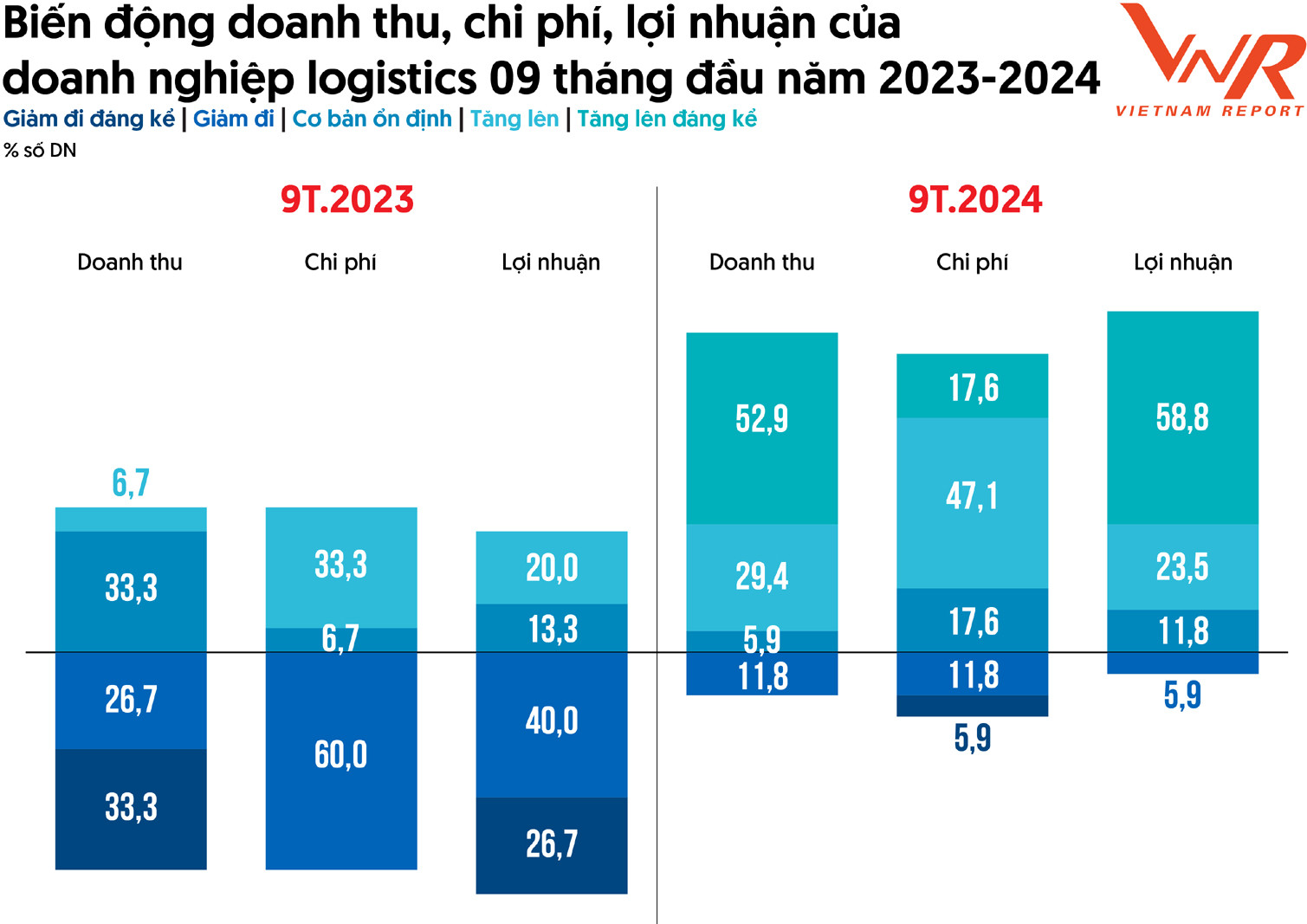
In that context, many logistics businesses are optimistic about the prospects for 2025. Specifically, 29.4% of businesses participating in Vietnam Report's survey assessed the industry's prospects as slightly better and 11.8% assessed them as much better; 64.7% said that the business situation would be slightly better and 17.6% said it would be very good.
Difficulties, strategies and policy recommendations of logistics enterprises
According to businesses participating in the survey, the five biggest difficulties facing the Vietnamese logistics market include: Global economic and political instability (82.4%); Competition between businesses in the same industry (76.5%); Slow growth of the world economy (58.8%); Legal barriers and administrative procedures (45.3%); Labor that does not meet the quantity/quality requirements (35.3%).
Accordingly, the strategies that logistics enterprises prioritize in the short term aim to optimize operating costs, improve productivity, develop human resources and diversify markets. In the long term, enterprises aim to promote digital transformation, apply technology and promote ESG practices, sustainable development and green logistics. This is an inevitable step in the context of the logistics industry having to optimize costs, increase operational efficiency and meet the increasing needs of customers.
However, ESG implementation is still a problem that needs a long-term solution when logistics is closely linked to transportation activities - a field that consumes large amounts of fossil fuels and cannot be transformed overnight. A recent survey by Vietnam Report shows that only 28.8% of enterprises are in the ESG planning stage, 31.2% of enterprises have made and implemented part of ESG commitments, but no enterprise has implemented them comprehensively.
Vietnam's logistics industry is making important changes thanks to the Government's support and cooperation, from reforming administrative procedures, investing in upgrading logistics infrastructure, encouraging technology application, promoting trade promotion policies, etc. To promote the development of the entire industry, businesses participating in the survey proposed important policy recommendations such as: Investing in transport infrastructure, telecommunications and information technology (88.2%); Having more policies to promote the development of the logistics service industry (88.2%); Simplifying administrative procedures and customs procedures (82.4%); Cutting infrastructure usage fees and charges (70.6%); Improving capacity for airport clusters, seaports, and border gates (58.8%).
With the support of the Government and the initiative of enterprises, the Vietnamese logistics industry not only overcomes current shortcomings but also aims to become a leading logistics center in the region, contributing to improving national competitiveness in the period of deep integration.
(Source: Vietnam Report)
Source: https://vietnamnet.vn/top-10-cong-ty-uy-tin-nganh-logistics-nam-2024-2346981.html






































![[Photo] General Secretary To Lam receives Korean Ambassador to Vietnam](https://vphoto.vietnam.vn/thumb/1200x675/vietnam/resource/IMAGE/2025/6/6/a0765b7543784cbcbfe4755b67d43ab4)

![[Photo] President Luong Cuong works with Hung Yen and Thai Binh Provincial Party Committees on implementing Resolution of the 11th Central Conference, 13th tenure](https://vphoto.vietnam.vn/thumb/1200x675/vietnam/resource/IMAGE/2025/6/6/127b735d2761484d81dcee0d7725a25b)















































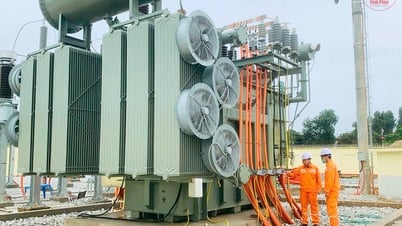








![[OCOP REVIEW] Tu Duyen Syrup - The essence of herbs from the mountains and forests of Nhu Thanh](https://vphoto.vietnam.vn/thumb/402x226/vietnam/resource/IMAGE/2025/6/5/58ca32fce4ec44039e444fbfae7e75ec)










Comment (0)